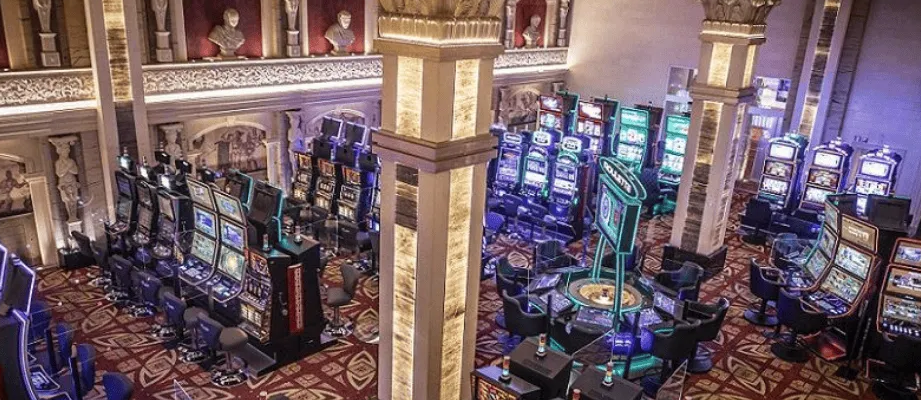Switzerland maintains one of the most structured and socially driven casino tax systems in the world. In 2024, while physical casinos faced a decline, online gambling continued its upward trajectory. The dual forces of technological evolution and regulatory oversight are reshaping the landscape of Swiss gambling—both fiscally and strategically.
The Swiss Casino Tax System and Industry Trends in 2024

Taxation Framework for Swiss Casinos
The Swiss casino taxation model is bifurcated based on casino classification and ensures that a significant portion of gambling profits benefit the public good.
A-Class vs B-Class Casinos
- A-Class Casinos: These are typically larger, more comprehensive establishments. 100% of their taxes are paid directly into the Old-Age and Survivors Insurance (AVS) fund.
- B-Class Casinos: Generally smaller, local casinos. They contribute 60% of taxes to AVS and 40% to their respective cantonal governments.
Tax Base and Rate
Taxes are calculated based on Gross Gaming Revenue (GGR)—defined as the total bets placed minus winnings paid out to players. The effective tax rate varies between 40% and 80%, depending on revenue volume. Importantly, these casinos are also subject to corporate income tax, resulting in double taxation—a matter of growing concern in the industry.
2024 Market Performance: Decline in Physical, Rise in Digital
Overview of the Physical Casino Landscape
In 2024, 21 land-based casinos operated in Switzerland. However, the year marked the end of the current licensing period. The Federal Council renewed 20 licenses, while Schaffhausen did not reapply—its market space will be taken by Winterthur (2025) and Prilly (expected 2026).
Key Metrics for Physical Casinos (2024):
- Total GGR: CHF 587.6 million – a 5.8% decrease from 2023.
- Tax Contribution: CHF 268.8 million – down 10.7%.
- Visitors: 3.6 million.
- Gaming Tables: 232.
- Slot Machines: 4,494 (accounting for 83% of GGR).
Top-Performing Land-Based Casinos:
- Mendrisio – CHF 71.6 million
- Zurigo – CHF 60.3 million
- Baden – CHF 55.5 million
- Basilea – CHF 55.1 million
- Montreux – CHF 47 million
Despite their strong figures, all five casinos reported a decline compared to 2023. In response, many are transitioning into multi-purpose entertainment hubs, offering dining, live events, and cultural programming to attract a broader audience.
Online Gambling: Growth Despite Challenges
Switzerland’s online gambling sector has been one of the brightest spots in the national gaming industry, driven by accessibility, partnerships with physical casinos, and strong digital infrastructure.
Structure and Regulation
Swiss law mandates that every online casino must partner with a licensed physical casino. As of 2024, 10 legal online casinos were operational, each tightly regulated by the Swiss Federal Gaming Board (SFGB). This ensures data security, responsible gambling measures, and financial transparency.
Key Online Metrics for 2024:
- Total GGR: CHF 309.9 million – an 8.5% increase.
- Tax Paid to AVS: CHF 132.1 million – up 10% year-on-year.
Although official rankings of the top five online casinos were not disclosed, industry trends indicate a concentration of market share among a few dominant platforms, all operating within the legal framework.
The Problem of Illegal Operators
Despite stringent laws and digital blocks, unauthorized international operators continue to attract Swiss players, accounting for an estimated 40% of the total market. These unregulated platforms evade taxation and consumer protections, posing both fiscal and social risks.
The Swiss Federal Gaming Board has ramped up enforcement and public awareness campaigns to steer users toward legal options. However, this remains a persistent issue undermining the otherwise robust regulatory framework.
Strategic Directions for the Future
With both segments of the industry undergoing transformation, Swiss casinos are embracing a dual-pronged strategy to secure long-term viability.
1. Reinventing the Physical Casino Experience
Land-based casinos are no longer just venues for gambling. Many are evolving into leisure destinations offering:
- Gourmet dining
- Live performances
- Art and cultural events
- Event hosting services
This shift aims to broaden the customer base, especially attracting younger audiences and tourists who seek diverse experiences.
2. Enhancing and Securing Online Gambling
For the digital sector, the emphasis is on:
- Tighter regulation and monitoring by SFGB
- Advanced anti-fraud mechanisms
- Responsible gambling frameworks
- Seamless mobile and desktop user experiences
The focus is clear: provide a safe, sustainable, and appealing online alternative to international operators.
Conclusion: Toward a Transparent and Responsible Gambling Ecosystem
The Swiss gambling industry, while facing evolving challenges, continues to make significant fiscal contributions, especially to social welfare through AVS. By focusing on innovation in experience and regulation, Switzerland is positioning itself as a model for sustainable and responsible gambling in Europe.
As the country gears up for future milestones—such as the 2025 launch of Winterthur and the 2026 debut of Prilly—the foundations laid today will determine the success of tomorrow’s gaming landscape.
Bonus Note: Meet the Industry at SiGMA Europe
If you’re interested in the future of gambling and gaming technology, don’t miss SiGMA Central Europe 2025 in Rome, scheduled for November 3–6 at Fiera Roma. With 30,000 attendees, 1,200 exhibitors, and over 700 speakers, it’s set to be a defining event for the industry’s next chapter.












